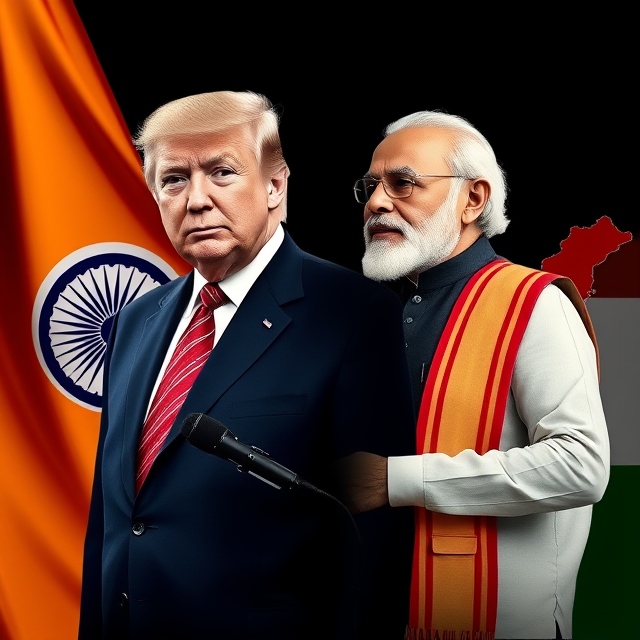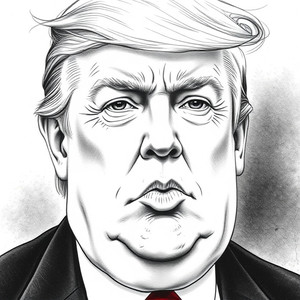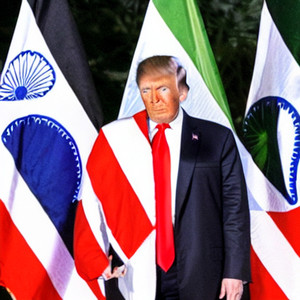
Trade Tensions with India: Trump’s return may lead to increased tariffs on Indian exports to the U.S., especially in the pharmaceutical and automobile sectors, potentially impacting India’s economy.
Anti-China Stance: Trump’s hard stance on China could benefit India as the U.S. might seek closer trade and strategic ties with India to counterbalance China.
South Asian Geopolitics: Trump’s administration could support India’s position on Pakistan and address concerns about the rights of Hindus in Bangladesh, aligning with India’s regional interests.
Donald Trump has made one of the most remarkable comebacks in American political history, being elected as the 47th President of the United States. His return has significantly changed the domestic political landscape in the U.S. Trump has always been considered an outsider in American politics—a leader who speaks his mind and is vocal about his priorities. Known for his “America First” approach, his return to the White House has sparked interest in countries like India, where many are keen to understand the potential implications for their own affairs.

From what we know about Donald Trump’s presidency, he has generally been supportive of India, but there is an expectation that the relationship with the U.S. may change depending on which party is in power. Historically, under Democratic leadership, the economic relationship between India and the U.S. has been strong, whereas, under Republican leadership, the relationship tends to become strained, with military and strategic relationships advancing. One of the sectors in India that could be impacted by Trump’s return is the economy.
Trump has been a strong critic of India’s trade policies. For instance, in 2020, he called India the “tariff king,” and during his recent campaign, he labeled India as the “greatest abuser of tariff policies.” Trump’s stance has been clear: he wants to increase tariffs on India’s exports to the U.S., particularly targeting the pharmaceutical and automobile sectors, which are two of India’s largest exports to America. These increased tariffs could make Indian products more expensive in the U.S., raising concerns about the impact on India’s economy.

Additionally, Trump’s idea of slashing corporate taxes and implementing broad tax cuts could lead to higher inflation in the U.S. market, which would, in turn, affect India. Such changes could lead to a drop in the value of the Indian rupee against the dollar.
One area where India may benefit is Trump’s stance on China. During his 2016-2021 administration, Trump initiated a “cold war” with China, imposing heavy tariffs on Chinese imports. In his recent presidential campaign, he has been vocal about introducing even stronger tariffs on Chinese goods, particularly to protect the U.S. automobile sector and other key industries. He has even suggested a 100% tariff on Chinese products. This could provoke retaliatory actions from China, leading to economic tensions between the U.S. and China.
Such tensions could create an opportunity for India, as the U.S. may look to replace China as a trading partner. This opens a window for India to capitalize on the situation. In terms of geopolitics, Trump’s hard stance on China could limit China’s geopolitical expansion in the region, which may contribute to stability along the India-China border. However, the Indian government should not rely solely on the U.S. to guarantee peace or stability between India and China. India must continue to handle its own border issues and diplomatic relations independently.
Donald Trump’s return could also impact South Asian geopolitics, particularly in countries like Pakistan. Trump has generally taken a moderate stance regarding Pakistan, but his position has often been more aligned with India’s interests, and India would certainly welcome further sidelining of Pakistan on the international stage due to its links with terrorism under a new Trump presidency.
The situation in Bangladesh becomes even more intriguing, as the country faces political instability with a new caretaker government in power. Sheikh Hasina, who has already congratulated Trump on his victory, has maintained stable ties with him. The new caretaker president, Yunis, has been a longstanding critic of Trump.
For India, it is expected that Trump may address concerns regarding India’s interests in Bangladesh, which has been a topic of discussion on his social media platform, Truth Social. Trump has expressed concern for the rights of Hindus in Bangladesh, stating that he would hold Bangladeshi authorities accountable for ongoing violence against the Hindu community.
Implications for India and South Asia
Donald Trump has made a historic comeback as the 47th President of the United States, reshaping the U.S. political landscape with his “America First” approach. Known for his blunt style and policy priorities, Trump’s return has sparked significant interest in India, where leaders and citizens alike are keen to understand the potential implications for U.S.-India relations and South Asia more broadly.
Opportunities Arising from U.S.-China Tensions
Trump’s hardline stance on China, which began with tariffs during his 2016–2021 administration, is expected to intensify, with him proposing even stronger tariffs on Chinese imports to protect U.S. industries. This could lead to further economic tensions between the U.S. and China, creating opportunities for India to strengthen its trade relationship with the U.S. As the U.S. potentially reduces reliance on China, India could step in as a preferred trading partner, allowing Indian companies to benefit from this shift in U.S. policy.
In terms of geopolitics, Trump’s tough stance on China could also curb Chinese expansionism in South Asia, contributing to regional stability. However, India must continue to handle its border issues with China independently and not rely solely on the U.S. for security assurances.
Implications for South Asia
Trump’s return may also impact U.S. policy toward Pakistan and Bangladesh. Historically, his stance on Pakistan has aligned more with India’s interests, as he has been critical of Pakistan’s ties to terrorism. This could work in India’s favor as it seeks to isolate Pakistan on the international stage.
In Bangladesh, Trump’s support for the Hindu community has been evident, with him promising to hold the authorities accountable for protecting minority rights. This could influence Bangladesh’s domestic policies, especially with its current political instability under the caretaker government.
Strengthening U.S.-India Partnership and Modi-Trump Ties

The personal rapport between Trump and Indian Prime Minister Narendra Modi has been instrumental in strengthening U.S.-India relations in recent years. During Trump’s first term, he and Modi cultivated a strong personal bond, symbolized by high-profile events like the “Howdy Modi” rally in Texas and “Namaste Trump” in India. This personal chemistry has fostered a closer partnership in areas like defense, trade, and counter-terrorism.
Trump’s return could further solidify this partnership, particularly in countering China’s influence in the Indo-Pacific region. Both leaders share a vision of a “free and open Indo-Pacific,” and a renewed Trump-Modi alliance could enhance defense cooperation and align strategic priorities. Additionally, Trump’s administration may continue to support India’s aspirations for a larger role on the global stage, including potential backing for a permanent seat on the United Nations Security Council.
Conclusion
Trump’s return to power brings a mix of opportunities and challenges for India and South Asia. While the economic relationship may face strains due to trade policy shifts, strategic alignment against China and strengthened defense ties could be beneficial for India. The personal bond between Trump and Modi could play a pivotal role in navigating these complex dynamics, as both countries work to deepen their partnership in an increasingly multipolar world.
Reference
1) https://www.ndtv.com/world-news/us-elections-2024-immigration-trade-military-how-trump-2-0-could-impact-india-us-relations-6954618
Aayush Pal is a freelance writer on contemporary geopolitical developments. The views expressed in his work are entirely his own.
